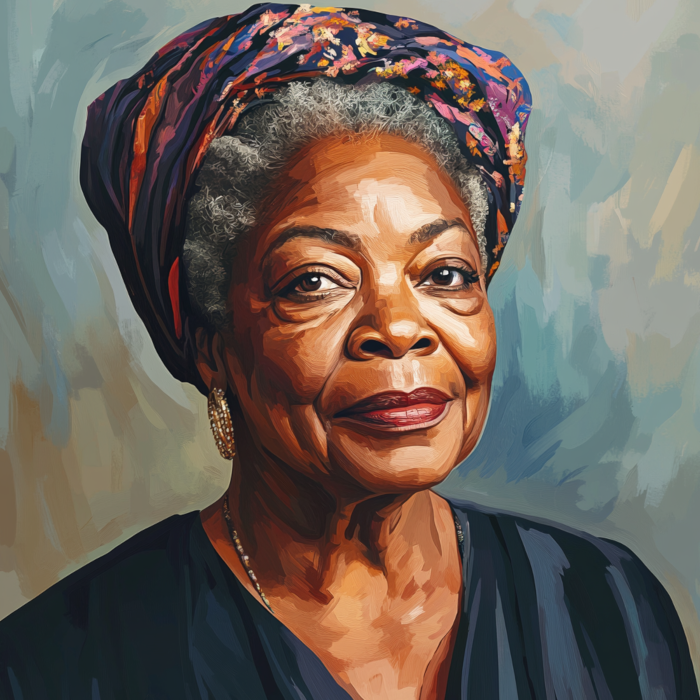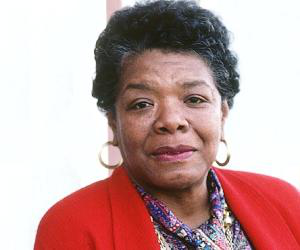

Poet

Maya Angelou (1928–2014) was an American poet, memoirist, and civil rights activist whose work has had a profound influence on literature, culture, and social justice movements. She is best known for her series of seven autobiographies, particularly I Know Why the Caged Bird Sings (1969), which brought her international recognition. Angelou's powerful use of language and her exploration of themes such as identity, racism, and resilience made her one of the most celebrated and influential voices in American literature.
Birth and Family: Maya Angelou was born Marguerite Annie Johnson on April 4, 1928, in St. Louis, Missouri. She was the daughter of Bailey Johnson, a doorman and naval dietitian, and Vivian Baxter Johnson, a nurse and card dealer. Her parents' turbulent marriage led to their separation when Angelou was very young, and she and her brother, Bailey Jr., were sent to live with their paternal grandmother in Stamps, Arkansas.
Childhood Trauma: Angelou's early years were marked by significant trauma. At the age of eight, while living with her mother in St. Louis, she was sexually abused and raped by her mother's boyfriend. After revealing the abuse to her family, the man was arrested but was released after a short time. He was later found dead, likely killed by Angelou's uncles. The trauma of the abuse and the subsequent events led Angelou to stop speaking for nearly five years. During this period of muteness, she developed a deep love for literature, memorizing and reciting works by Shakespeare, Edgar Allan Poe, and other classic writers.
Early Career and Artistic Pursuits: Before becoming a writer, Angelou had a diverse career that included working as a cook, nightclub dancer and performer, and actress. In the 1950s, she toured Europe with a production of Porgy and Bess, appeared in off-Broadway productions, and released a calypso album. Her stage name, Maya Angelou, came from a combination of her childhood nickname "Maya" and her first husband's surname, "Angelou."
Civil Rights Activism: Angelou was deeply involved in the civil rights movement during the 1960s. She worked with Dr. Martin Luther King Jr. as the Northern Coordinator for the Southern Christian Leadership Conference (SCLC) and later became friends with Malcolm X, helping him establish the Organization of Afro-American Unity. Her activism and connections with prominent civil rights leaders greatly influenced her writing and public speaking.
I Know Why the Caged Bird Sings (1969): Angelou's literary career took off with the publication of her first autobiography, I Know Why the Caged Bird Sings. The book, which details her early life, including her experiences with racism, sexual abuse, and overcoming adversity, was groundbreaking for its candid portrayal of the struggles faced by Black women in America. The book received critical acclaim and became a bestseller, earning Angelou widespread recognition and establishing her as a leading literary figure.
Subsequent Autobiographies: Following the success of I Know Why the Caged Bird Sings, Angelou wrote six more autobiographies that continued to explore her life experiences, personal growth, and the broader social and political context of the times. These include Gather Together in My Name (1974), Singin’ and Swingin’ and Gettin’ Merry Like Christmas (1976), The Heart of a Woman (1981), All God’s Children Need Traveling Shoes (1986), A Song Flung Up to Heaven (2002), and Mom & Me & Mom (2013). Each of these works delves into different periods of her life, offering insights into her evolving identity and her experiences as a Black woman in America.
Poetry and Other Writings: In addition to her autobiographies, Angelou was an accomplished poet. Her poetry collections, including Just Give Me a Cool Drink of Water 'fore I Diiie (1971) and And Still I Rise (1978), are celebrated for their lyrical beauty, emotional depth, and powerful social commentary. Her poem "On the Pulse of Morning," which she wrote and delivered at President Bill Clinton's inauguration in 1993, earned her further acclaim and highlighted her role as a voice for justice and equality.
Teaching and Public Speaking: Throughout her life, Angelou was also an educator and a sought-after public speaker. She held teaching positions at several universities, including Wake Forest University in North Carolina, where she was the first Reynolds Professor of American Studies. Angelou's lectures and public appearances were known for their warmth, wisdom, and ability to inspire audiences across generations.
Awards and Honors: Angelou received numerous awards and honors throughout her life, including three Grammy Awards for her spoken word albums, the Presidential Medal of Freedom in 2011, and more than 50 honorary degrees. Her contributions to literature, civil rights, and cultural life in America have made her one of the most decorated and respected figures in the arts.
Death: Maya Angelou passed away on May 28, 2014, at the age of 86. Her death was widely mourned, and tributes poured in from around the world, recognizing her impact as a writer, activist, and mentor.
Cultural Impact: Maya Angelou's work has had a lasting impact on American literature and culture. Her autobiographies, in particular, have become essential reading in understanding the complexities of race, gender, and identity in the United States. Angelou's ability to convey the struggles and triumphs of the human spirit has resonated with readers worldwide.
Voice for Social Justice: Angelou's commitment to social justice and her advocacy for the rights of marginalized communities have left a profound legacy. Her writing and activism have inspired countless individuals to challenge injustice, embrace their identities, and work towards a more equitable society.
Enduring Relevance: Angelou's themes of resilience, empowerment, and the power of language continue to be relevant today. Her poetry and prose are frequently quoted and studied in educational settings, and her life story serves as a source of inspiration for those facing adversity.
Celebration of Black Womanhood: One of Angelou's most significant contributions is her celebration of Black womanhood. She depicted the experiences of Black women with honesty, dignity, and pride, challenging stereotypes and highlighting the strength and beauty of her community.
Maya Angelou was a literary giant, a powerful voice for civil rights, and a beacon of hope and inspiration. Her work, characterized by its deep humanity and unwavering commitment to justice, has left an indelible mark on the world. Through her poetry, memoirs, and activism, Angelou gave voice to the voiceless, empowered generations of readers, and contributed to the ongoing struggle for equality and dignity for all people. Her legacy as a writer, activist, and teacher continues to inspire and uplift, ensuring that her impact will be felt for generations to come.

We use cookies
We use cookies and other tracking technologies to improve your browsing experience on our website, to show you personalized content and targeted ads, to analyze our website traffic, and to understand where our visitors are coming from. Privacy Policy.